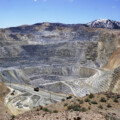In the name of achieving “net-zero” (or carbon neutral) objectives and cleaning up the environment, many politicians have signed pledges to leave fossil fuels in the ground and to ban plastics. Almost never discussed in this context, however, is why coal, petroleum, natural gas, plastic, and composite materials were developed in the first place. The economic and environmental benefits of these things are either ignored or simply taken for granted. They shouldn’t be.
Our ancestors would have never extracted fossil fuels on a large scale if these fuels had not delivered otherwise unattainable benefits or created lesser problems than what had existed before. In a lyrical tribute to his friend penned more than 200 years ago, Sir Walter Scott described James Watt as the “man whose genius discovered the means of multiplying our national resources to a degree perhaps even beyond his own stupendous powers of calculation and combination.” Watt’s steam engine made it possible to bring the “treasures of the abyss to the summit of the earth” and gave the “feeble arm of man the momentum of an Afrite.” From then on, man was able to command “manufactures to arise, as the rod of the prophet produced water in the desert.” It afforded him the “means of dispensing with that time and tide which wait for no man.” Through his coal-powered inventions, Watt became a “potent commander of the elements,” an “abridger of time and space,” a “magician, whose cloudy machinery has produced a change on the world, the effects of which, extraordinary as they are, are perhaps only now beginning to be felt.”
Watt’s invention created environmental problems, especially smoke and soot, but it also delivered significant economic, health, and green benefits. For instance, the massive industrialization and urbanization of the last two centuries not only resulted in the most significant growth in population numbers and income per capita in history, but also drastically improved the health and life expectancy of humanity.
Fossil fuels also simultaneously delivered a “forest transition,” meaning an expansion of the forest cover in all advanced economies (and in an increasingly large number of developing economies) that spared many marginal wetlands, grasslands, and forestlands from the plough. This was possible due to the production of ever more food on ever less land and by the large-scale substitution of resources produced on the surface of the planet by others dug or pumped from below.
The first significant substitution was the displacement of fuelwood by coal. As English economist William Stanley Jevons observed in 1865, “forests of an extent two and a half times exceeding the whole area of the United Kingdom would be required to furnish even a theoretical equivalent to [the country’s] annual coal produce.” Luckily for humanity, the development of fossil fuels has since Jevons’ time continued to dwarf traditional biomass as a source of energy.
Fossil fuels also provided key components for the creation of synthetic products that replaced materials once manufactured from animals and plants, to the benefit of whales (whale oil, baleen, perfume base), birds (feathers), and elephants, polar bears, alligators, and many other wild animals trapped or killed for their ivory, fur, or skin. Fossil fuels and synthetic products also obliterated the demand for wild and domesticated plants and trees that produced lumber, pulp, fiber, rubber, dyes, pesticides, and fertilizers.

Synthetic products drastically reduced the demand for animal fiber and leather while the replacement of work animals such as horses, mules, and oxen made much agricultural land devoted to their feeding and care available for food production or reforestation. As geologist Kirtley Fletcher Mather noted approvingly in 1944, a century earlier “nearly 80 percent of all the things men used were derived from the plant and animal kingdoms, with only about 20 percent from the mineral kingdom.” By the time of his writing, however, “only about 30 percent of the things used in industrialized countries come from things that grow; about 70 percent have their sources in mines and quarries.”
Paradoxically, climate change has become the dominant environmental issue of our time precisely because of the past creation of abundant, affordable, and scalable energy and synthetic products from fossil fuels. Banning these products in the absence of superior substitutes, however, can only recreate some of the very real problems they once solved, including threats to wildlife habitat and biodiversity.
Recommended for You

Sean Speer: Investing in critical minerals isn’t just good business, it’s a national security imperative

‘It’s really important that we make mining fashionable again’: Ken Ash on why mining is essential to creating a happy and secure Canada

DeepDive: The Kananaskis agenda: An action plan for natural gas

‘Nobody cares who your daddy is’: John Whittaker and Rahim Sajan on what makes Alberta attractive to dreamers, strivers, and entrepreneurs



